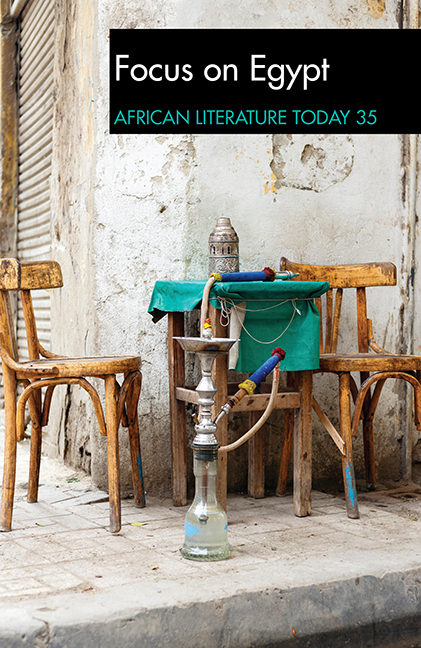Book contents
- Frontmatter
- Dedication
- Contents
- Notes on Contributors
- Foreword
- EDITORIAL ARTICLE
- ARTICLES
- Coping with a Failed Revolution: Basma Abdel Aziz, Nael Eltoukhy, Mohammed Rabie & Yasmine El Rashidi
- The Complications of Reading Egypt as Africa: Translation & Magdy el-Shafee's مترو (Metro)
- Narratives of the ‘Nubian Awakening’: Reclaiming Egypt's African Identity
- Frantz Fanon's Conceptualization of Decolonization in Sonallah Ibrahim's The Committee
- Romance as Epistemological Aesthetic in the Fiction of Ahdaf Soueif
- Literature as Prophecy: Re-Reading Yusuf Idris's The Cheapest Nights
- Travel & Discovery: Hopes for a New Egypt in Mohamed Salmawy's Butterfly Wings
- The Symbolic Relevance of the Use of the Eye in Nawal El Saadawi's Two Women in One & God Dies by the Nile
- African Epics: A Comparative Study of Sundiata & Al-Sirah al-Hilaliyyah
- Conversations with Nawal El Saadawi: Online interview
- FEATURED ARTICLES
- LITERARY SUPPLEMENT
- TRIBUTE
- REVIEWS
- Reviews of Nigerian Poetry
Literature as Prophecy: Re-Reading Yusuf Idris's TheCheapest Nights
from ARTICLES
Published online by Cambridge University Press: 24 August 2019
- Frontmatter
- Dedication
- Contents
- Notes on Contributors
- Foreword
- EDITORIAL ARTICLE
- ARTICLES
- Coping with a Failed Revolution: Basma Abdel Aziz, Nael Eltoukhy, Mohammed Rabie & Yasmine El Rashidi
- The Complications of Reading Egypt as Africa: Translation & Magdy el-Shafee's مترو (Metro)
- Narratives of the ‘Nubian Awakening’: Reclaiming Egypt's African Identity
- Frantz Fanon's Conceptualization of Decolonization in Sonallah Ibrahim's The Committee
- Romance as Epistemological Aesthetic in the Fiction of Ahdaf Soueif
- Literature as Prophecy: Re-Reading Yusuf Idris's The Cheapest Nights
- Travel & Discovery: Hopes for a New Egypt in Mohamed Salmawy's Butterfly Wings
- The Symbolic Relevance of the Use of the Eye in Nawal El Saadawi's Two Women in One & God Dies by the Nile
- African Epics: A Comparative Study of Sundiata & Al-Sirah al-Hilaliyyah
- Conversations with Nawal El Saadawi: Online interview
- FEATURED ARTICLES
- LITERARY SUPPLEMENT
- TRIBUTE
- REVIEWS
- Reviews of Nigerian Poetry
Summary
In the earlydays of the 2011 Egyptian revolution, western media outletslike The Baltimore Sun newspaper andThe New Yorker, proposed ‘Best Books onEgypt’ lists to their readerships, ostensibly to help themto better understand the country and its revolution.Interestingly, many of those proposals were fictional texts,some written more than fifty years before the revolution,chief among which were Yusuf Idris's The CheapestNights, Naguib Mahfouz's The CairoTrilogy and Alaa Al Aswany's TheYacoubian Building: A Novel. Such indicationsbring to mind the interrelationship between literature andhistory which is a hallmark of African art. The functionalpremise often accorded African art forms by both writers andcritics alike indicates that, in most if not all cases,readers expect the continent's literature to speak about itshistorical evolution. For instance, Chinua Achebe says thatAfrican literature, like all other literature, ‘speaks of aparticular place, evolves out of the necessities of itshistory, past and current and the destiny of its people’(‘The Role of the Writer in a New Nation’: 7). For Ngugi waThiong'o in Writers in Politics, theAfrican ‘writer's work is often an attempt to come to termswith the thing that has been, a struggle, as it were, tosensitively register his encounter with history, hispeople's history’ (39). The books listed above might havebeen selected because they help the reader to understand thecollective reality of the Egyptian peoples, theirperceptions of the world and their place in it. At the sametime, they underline the artist's role in ‘bringing theincomplete picture that the historical perspective offersinto sharper relief’ (Fox ‘Egypt: The Search for Identity’).This resonates with the Aristotelian perspective of thesuperiority of art to history because of the former'scapacity to discuss events ‘as they were or are, or as theyare said to be or seem to be, or as they ought to be’ (‘Onthe Art of Poetry’: 69). Herein lies the prophetic dimensionof literature that is the focus in this paper.
This visionaryquality occurs when the writer's composite representation ofthe historical moment informs both the present and thefuture.
- Type
- Chapter
- Information
- ALT 35: Focus on EgyptAfrican Literature Today 35, pp. 89 - 104Publisher: Boydell & BrewerPrint publication year: 2017

